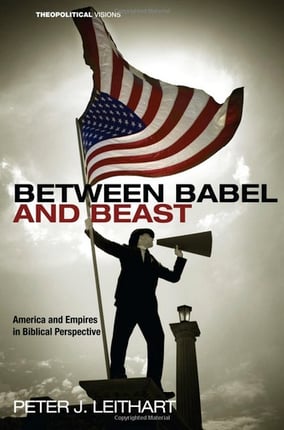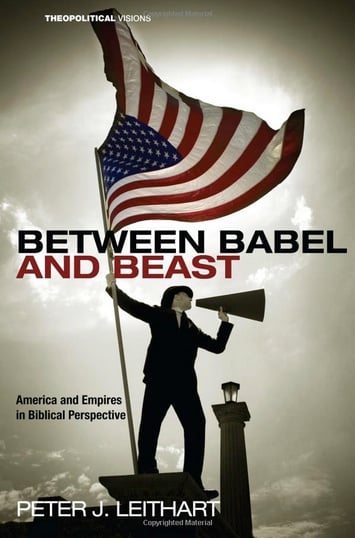Editor's note: I am pleased to publish this two part review by Brian Auten of Peter Leithart's new book. Brian is a reader and friend of mine and this review is both substantive and important. I commend both parts to you, eagerly, and encourage you to buy the book itself.
From now until July 31st, using LEITHART as a coupon code at Wipf and Stock will save you 40% off the cover price.
In his recent remarks about Christian-and-conservative political activity of a "non-culture war" variety, Matt drew attention, among other things, to the church’s identity as a counter-polis and the potential of a responsibility-focused (in contrast to a virtue-focused) definition of American exceptionalism. As regards the first, the church, as Matt put it, has “its own culture, [symbols], ways of speaking and manners of formation” and one shouldn’t think they have to be Anabaptist or pitch their tents in the Hauerwas/Yoder campground in order to appreciate the importance of the local church – its collective witness, theological formation and discipleship – for Christian political engagement.
Riffing from Douhat, Matt’s second point on American exceptionalism is one that would also be familiar to readers of Jean Bethke Elshtain’s Just War Against Terror (not to mention almost any Marvel or DC superhero comic): the United States is exceptional because it’s been blessed with immense power, which means that it will be judged – with the rest of the quick and the dead – as to whether its power has been used responsibly, ethically and justly.
 Matt’s points provide an uncannily well-timed segue into Peter J. Leithart’s soon-to-be-released polemic, Between Babel and Beast: America and Empires in Perspective (Cascade Books, 2012). Billed as a book-length footnote to his recent Defending Constantine, Between Babel and Beastcontinues Leithart’s long-term project of showing how the “kingdoms of the world have and will, more and more, become kingdoms of our Lord and of His Christ” and how the church’s presence means “always and forever, an end to ‘business as usual’ [in the earthly city].” ((Leithart’s long-term project, I would assert, goes back to his involvement with the Tyler Circle Reconstructionists in the 1980s. At that time, Christian Reconstructionism was divided into two distinct wings, or what one might call the “Vallecito [California] Circle” and the “Tyler [Texas] Circle.” The Vallecito Circle was centered around Rushdoony and the Chalcedon Foundation, while the Tyler Circle was comprised of former students of Greg Bahnsen (including James B. Jordan and David Chilton), Ray Sutton’s Westminister Presbyterian Church, as well as Gary North’s Institute for Christian Economics. Indeed, a number of Jordan’s ideas about Babel and empire, referenced by Leithart in this book, were discussed in Gary North’s Healer of the Nations: Biblical Blueprints for International Relations (Dominion Press, Fort Worth, TX, 1987), pp. 66-75. One difference between the two “circles” involved the comparative importance of the family as the locus for Christian Reconstructionism (Vallecito) versus the church (Tyler). For a detailed, archive-based study of this, one will have to await the public release of Michael McVicar’s Ph.D. dissertation on Rushdoony and the history of Christian Reconstructionism.)) (([2] Against Christianity, pp. 147-148, 154.))
Matt’s points provide an uncannily well-timed segue into Peter J. Leithart’s soon-to-be-released polemic, Between Babel and Beast: America and Empires in Perspective (Cascade Books, 2012). Billed as a book-length footnote to his recent Defending Constantine, Between Babel and Beastcontinues Leithart’s long-term project of showing how the “kingdoms of the world have and will, more and more, become kingdoms of our Lord and of His Christ” and how the church’s presence means “always and forever, an end to ‘business as usual’ [in the earthly city].” ((Leithart’s long-term project, I would assert, goes back to his involvement with the Tyler Circle Reconstructionists in the 1980s. At that time, Christian Reconstructionism was divided into two distinct wings, or what one might call the “Vallecito [California] Circle” and the “Tyler [Texas] Circle.” The Vallecito Circle was centered around Rushdoony and the Chalcedon Foundation, while the Tyler Circle was comprised of former students of Greg Bahnsen (including James B. Jordan and David Chilton), Ray Sutton’s Westminister Presbyterian Church, as well as Gary North’s Institute for Christian Economics. Indeed, a number of Jordan’s ideas about Babel and empire, referenced by Leithart in this book, were discussed in Gary North’s Healer of the Nations: Biblical Blueprints for International Relations (Dominion Press, Fort Worth, TX, 1987), pp. 66-75. One difference between the two “circles” involved the comparative importance of the family as the locus for Christian Reconstructionism (Vallecito) versus the church (Tyler). For a detailed, archive-based study of this, one will have to await the public release of Michael McVicar’s Ph.D. dissertation on Rushdoony and the history of Christian Reconstructionism.)) (([2] Against Christianity, pp. 147-148, 154.))
Defending Constantine is Leithart’s treatise against Yoderian interpretations of early church pacifism, the church’s ostensible fourth-century fall and “Constantinian” captivity. In Defending, Leithart addressed what he had identified in earlier work as the central disconnect in Yoderian and Hauerwasian political theology – namely, if the church is indeed a polis, why the apoplexy over any explicitly Christian ordering of worldly politics? “Will the king always refuse to listen?” asked Leithart in what is undoubtedly the most succinct—and one of the more trenchant--critiques of Hauerwas, “[And] when the king begins to listen, must the church fall silent [and refuse to succeed]?” ((Against Christianity, pp. 148, 150.)) While Leithart has conceded that Constantine by no means an unsullied model of Christian political engagement, ((See Leithart’s blog post, “What if they ask? What if they listen,” outlining part of his response to critiques of Defending Constantine by Mark Thiessen Nation and Vigen Guroian at the 2011 American Academy of Religion (AAR) annual conference.)) the point is that, first and foremost, he listened, and because he listened, the empire, over time, turned its back on religious sacrifice (“de-sacrificed”) and was “baptized.”
Login to read more
Sign in or create a free account to access Subscriber-only content.
